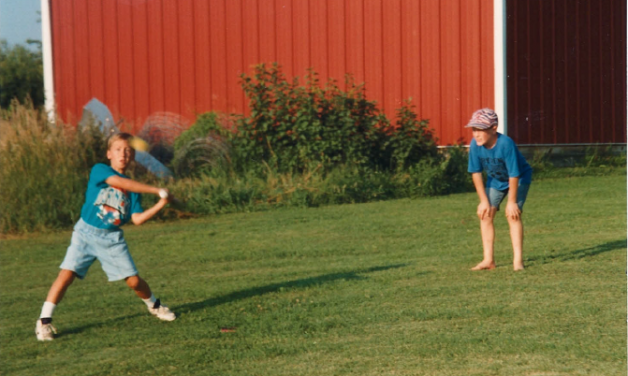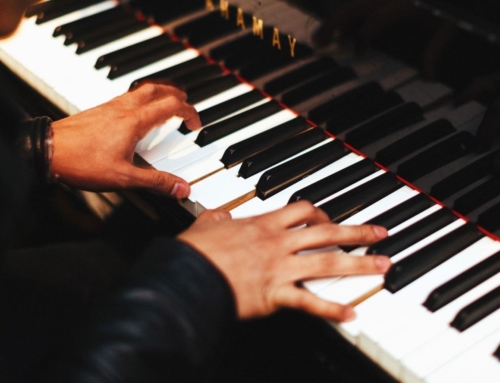When I was little, there was a man named Bob Costello who visited our family. He’s a childhood friend of my dad, and one afternoon when he was playing baseball with my brothers and me in the front yard, it started to rain. We began to pout and walk towards the door, when Costello threw out his arms and told us to hold on. “I will stop the rains!” he said. Then right in front of us, he shouted at the sky, “Stooooop!” And in just a few seconds it did. As we stood there together wide-eyed in the driveway, I marveled to myself that here was a miracle man. Then I grew up, and realized that he was a jokester, and could tell the weather was passing over, and simply chose the right moment to try out his luck.
When I was little, I was convinced that the world was made up of two types of people: good guys and bad guys. Our paper boy was a bad guy. His name was Adam, and by the mere fact that he was older and didn’t smile often and threw the newspaper onto the lawn without walking up to the porch, I knew he was a bad guy. I was confirmed in this belief many times, as when he threw snowballs at us in winter (even though we instigated the skirmish), or when he and his teenage friends rode dirt bikes right through our yard to scare us. I projected these feelings onto everything else he did. When he wore shorts outside in winter, I looked out the window and said, “Look at that bad guy wearing shorts in the cold…” When his friend Anthony legally changed his last name (because of his parents’ divorce), I thought, “I can’t believe that bad guy would change his name…” Then I grew up, and realized that the world wasn’t made up of people strictly good or bad, but most were somewhere in the middle. Adults spend most of their time trying to make it through their own routine, not building up a bully persona.
When I was little, I believed in Santa Claus. Months before Christmas I would spend hours browsing the Sears catalogue, then put in great effort (especially during class time) drawing up a long wish list of presents. Christmas morning would be the only day of the year when I would spring out of bed, to see what arrived under the tree. Then I grew up, and now I don’t even know what to ask for. Much of the earlier magic of that day has been preserved and transferred to the mystery of the Nativity, but I no longer spring out of bed like I used to.
✠
Some may argue that childhood dreams stay in childhood. This is half true. Some things do in fact change when we grow up, and we realize we were wrong about certain details. But I would argue that many more of our childhood convictions about life end up being true, rather than innocent deceptions which we soon grow out of.
When I was little, I believed that God was real. Then I grew up, and I’ve become even more convinced that He is.
When I was little, I believed God could work miracles. Then I grew up, and I have seen them.
When I was little, I believed that life was an adventure. Then I grew up, and I found out that it really is, although some of the great adventures are not in new places, but in new people; they are not waiting for us out there in the wide world, but they happen within our own homes, or our same circle of friends, or within our souls.
When I was little, I believed that love is real. Above all, I believed that my family loved me. Then I grew up, and I found out that despite the years of growing used to each other and the years of adolescent withdrawal, they still loved me. Better even than I first thought.
When I was little, I believed the best way to spend your time was playing games. Then I grew up, and I still believe they’re important. Leisure is the “basis of culture,” as Josef Pieper once said. I still love to tell stories, and swim, and see friends, just like I always have. Even God likes playing games, as He spends our life playing hide-and-seek with us: We know all of his favorite hiding places (the tabernacle, or the scriptures, or silence, or our neighbor), but we don’t always find him when we look, so He keeps us searching and coming back to the same places.
When I was little, I knew that life had many problems, and that we should pray for those people who are struggling – for brothers and sisters who we fight with, or for my friend’s parents who got divorced, or for my favorite aunt to stop smoking. Then I grew up, and after all the philosophical explanations of suffering, the answer remains the same: Jesus didn’t give us an explanation for it all in words. Instead, he gave us a response. He taught us to pray, which is still the most profound response we’ve got, even though we were taught this since we were little.
Some may think that childhood is a time of ignorance – a sort of incomplete stage before we find out what life is really all about. Others can see it differently – that after the fall of man, God purposefully left children the way they are now. Children are an icon for the rest of us of what really matters in life. Their approach to life has many of the right instincts, which we would forget in growing up, unless they were there to remind us.
Of course, there are always a few amendments we make as we go along, for growing up is a lifelong education, and we’re constantly learning and re-learning the art of living. Yet the dreams of my childhood remain. In the words of G.K. Chesterton, “My first and last philosophy, that which I believe in with unbroken certainty, I learnt in the nursery… The things I believed then [are] the things I believe most now.”
✠
Image: Danaher Baseball, ca. 1994







